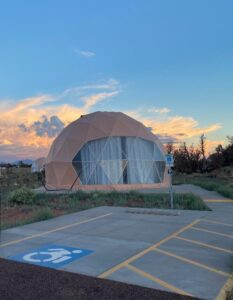Lamoine became the latest Maine town to pause a big development, putting a temporary halt on proposed luxury “glampground” less than 10 miles from Acadia National Park.
Voters at a special town meeting on Tuesday overwhelmingly supported a moratorium ordinance that halts Lamoine’s issuance of permits and application approvals for glampgrounds, hotels, motels and other resorts for the next 180 days.
The ordinance’s approval comes just a week after Arizona-based company Clear Sky Resorts met with members of the Lamoine Planning Board to further review the company’s application to develop a glampground on Partridge Cove.
The moratorium would put a hold on any additional consideration of Clear Sky Resorts’ application for the six-month period, according to town attorney Dan Pileggi, and pause consideration of any new applications.
It also gives the town Planning Board an opportunity to review its existing ordinance structure and determine if new ordinances are required to regulate similar developments, Pileggi said.
Clear Sky Resorts submitted an application in January to develop 12 acres of a 230-acre parcel on Partridge Cove into a high-end camping resort called “Clear Sky Acadia,” which prompted opposition from local residents concerned about its size and location.
The application includes plans for dozens of dome-shaped lodging structures, ranging from 425 to 845 square feet, full of amenities like electricity, running water and air conditioning that make them more akin to hotel rooms than campsites.
Aside from the 90 “guest domes,” the campground would feature a restaurant, spa, employee housing and “activity domes” for stargazing and bird watching.
Opposition to the glampground proposal was later centralized by local non-profit Growing Lamoine Responsibly, which petitioned for the moratorium ordinance to be voted on at a special town meeting.
Roughly 399 Lamoine residents packed the gymnasium of the Lamoine Consolidated School for Tuesday’s meeting, accounting for just under 25% of registered voters, and less than 10 voted against the moratorium, according to town administrator Stu Marckoon.
The turnout, Marckoon wrote in an email on Wednesday, “shattered records for attendance at an open town meeting.”
Lamoine residents previously gathered en masse for a June 5 public hearing on the Clear Sky Acadia application.
There, many residents voiced concerns over how the resort would affect roadways, drinking water, waste disposal and public safety personnel, predicting that Lamoine’s infrastructure might not have the capacity for all the guests and employees.

Clear Sky Resorts owner Hal Feinberg has addressed some of the environmental concerns by highlighting his company’s respect of the wetlands and vernal pools that abound on the property.
Feinberg and Clear Sky Resorts own a similar 45-dome glampground outside of Grand Canyon National Park in Williams, Ariz. At the public hearing, Feinberg said Lamoine’s dark skies, wetlands and proximity to Acadia made the parcel an attractive location.
Feinberg could not be reached on Wednesday for comment on the moratorium’s passage, but in a July interview, he said he was shocked by the moratorium’s potential reach.
He said company attorneys will “look at all of the avenues to see where it takes us,” adding that they’ve followed the tasks set out by town officials.
Amy Morley, a founder of Growing Lamoine Responsibly, said in an interview on Wednesday that the moratorium’s overwhelming passage shows how united the town is in opposition to Clear Sky’s proposal, and is a message to other Maine communities.
“Maine citizens really can have a voice in shaping development,” Morley said. “Maine is a very special place and it has a lot to offer visitors … and it has to be protected. I think it’s our responsibility, to future visitors, to protect it.”
Morley said the moratorium now allows the Planning Board to reconsider its ordinances for hotels, motels, resorts and luxury campgrounds, and is hopeful that whatever it comes up with aligns with language in the town’s 2020 comprehensive plan.
The plan emphasizes a need to “facilitate the flourishing of small and home-based businesses as its economic base” and recommended the prohibition of hotels and motels in areas zoned rural agricultural.
On Wednesday, Planning Board member Steve Gabel-Richards said developing new ordinance language around these developments “will be a priority,” and said the moratorium gives the board a chance to do just that, though it was too early to make further predictions.
In Tremont, a six-month moratorium adopted in November 2021 stopped all campground developments after a controversial 154-site luxury campground was proposed near Goose Cove.
Tremont residents later adopted strict standards for future campground developments that impose size restrictions and spacing requirements, the most stringent in Hancock County.
Development moratoriums have not only followed controversial glampground proposals in Maine, but also a 2,500 acre, $1 billion patriotic theme park north of Columbia Falls.
Morley said Lamoine’s success with adopting a moratorium provides further proof that they are a successful blueprint for small town Maine residents looking to slow development and give local planning boards time to reevaluate their ordinances.
“And the whole reason that moratoriums work well is that not only [do they] stop review of those proposals,” Morley said, they “give the planning board time to actually revise their ordinances.”
Marckoon said on Wednesday that the town Planning Board and Select Board would likely meet sometime in September to further discuss the implementation of the moratorium ordinance.







